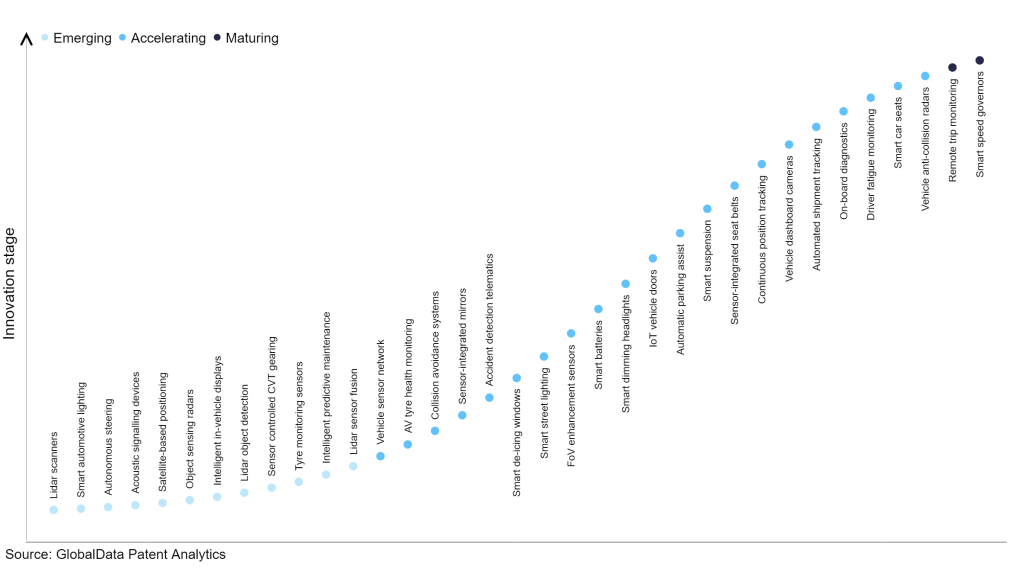The automotive industry continues to be a hotbed of patent innovation. Activity is driven by integration of real-time monitoring, and growing importance of technologies such as sensors, artificial intelligence, and machine learning. In the last three years alone, there have been over 1.7 million patents filed and granted in the automotive industry, according to GlobalData’s report on Internet of Things in automotive: continuous position tracking. Buy the report here.
However, not all innovations are equal and nor do they follow a constant upward trend. Instead, their evolution takes the form of an S-shaped curve that reflects their typical lifecycle from early emergence to accelerating adoption, before finally stabilizing and reaching maturity.
Identifying where a particular innovation is on this journey, especially those that are in the emerging and accelerating stages, is essential for understanding their current level of adoption and the likely future trajectory and impact they will have.
300+ innovations will shape the automotive industry
According to GlobalData’s Technology Foresights, which plots the S-curve for the automotive industry using innovation intensity models built on over one million patents, there are 300+ innovation areas that will shape the future of the industry.
Within the emerging innovation stage, LiDAR scanners, smart automotive lighting, and autonomous steering are disruptive technologies that are in the early stages of application and should be tracked closely. Vehicle sensor network, AV tyre health monitoring, and collision avoidance systems are some of the accelerating innovation areas, where adoption has been steadily increasing. Among maturing innovation areas are remote trip monitoring and smart speed governors, which are now well established in the industry.
Innovation S-curve for Internet of Things in the automotive industry

Continuous position tracking is a key innovation area in Internet of Things
A continuous position tracking system is an electronic device installed in an automobile to track the automobile’s location. The system works using GPS and GSM modules to track the exact and accurate position of the vehicle at any location. The device is also equipped with a display to show the current location of the vehicle to the user.
GlobalData’s analysis also uncovers the companies at the forefront of each innovation area and assesses the potential reach and impact of their patenting activity across different applications and geographies. According to GlobalData, there are 30+ companies, spanning technology vendors, established automotive companies, and up-and-coming start-ups engaged in the development and application of continuous position tracking.
Key players in continuous position tracking – a disruptive innovation in the automotive industry
‘Application diversity’ measures the number of applications identified for each patent. It broadly splits companies into either ‘niche’ or ‘diversified’ innovators.
‘Geographic reach’ refers to the number of countries each patent is registered in. It reflects the breadth of geographic application intended, ranging from ‘global’ to ‘local’.
Patent volumes related to continuous position tracking
| Company | Total patents (2010 - 2022) | Premium intelligence on the world's largest companies |
| Huawei Investment & Holding | 249 | Unlock Company Profile |
| ZTE | 72 | Unlock Company Profile |
| Deutsche Telekom | 23 | Unlock Company Profile |
| FedEx | 88 | Unlock Company Profile |
| Qualcomm | 1398 | Unlock Company Profile |
| Microsoft | 59 | Unlock Company Profile |
| Johnson Controls International | 41 | Unlock Company Profile |
| Alphabet | 29 | Unlock Company Profile |
| Apple | 184 | Unlock Company Profile |
| Extreme Networks | 31 | Unlock Company Profile |
| Fraunhofer-Gesellschaft zur Forderung der Angewandten Forschung | 22 | Unlock Company Profile |
| Apogee Technology | 31 | Unlock Company Profile |
| NETGEAR | 34 | Unlock Company Profile |
| Nokia | 104 | Unlock Company Profile |
| Juniper Networks | 22 | Unlock Company Profile |
| Life360 | 37 | Unlock Company Profile |
| Telefonaktiebolaget LM Ericsson | 253 | Unlock Company Profile |
| Sony Group | 105 | Unlock Company Profile |
| Nippon Telegraph and Telephone | 28 | Unlock Company Profile |
| LG | 115 | Unlock Company Profile |
| International Business Machines | 21 | Unlock Company Profile |
| Datang Telecom Technology | 35 | Unlock Company Profile |
| BlackBerry | 21 | Unlock Company Profile |
| Intel | 120 | Unlock Company Profile |
| Polaris Wireless | 19 | Unlock Company Profile |
| NextNav | 30 | Unlock Company Profile |
| Liberty Broadband | 24 | Unlock Company Profile |
| Ossia | 27 | Unlock Company Profile |
| Guangdong Oppo Mobile Telecommunications | 23 | Unlock Company Profile |
| Samsung Group | 129 | Unlock Company Profile |
| Humatics | 27 | Unlock Company Profile |
| Golba | 26 | Unlock Company Profile |
| Mapsted | 18 | Unlock Company Profile |
Source: GlobalData Patent Analytics
Qualcomm is the leading patent filer in the continuous position tracking technology. The company provides automakers with a comprehensive 3D navigation solution, which combines multi-constellation GNSS precise positioning. Other innovators in the continuous position tracking innovation area are Ericsson, Huawei Investment, and Apple.
In terms of application diversity, FedEx held the top position, while Johnson Controls International and Mapsted stood in second and third positions, respectively. By means of geographic reach, FedEx leads the pack, followed by Life360 and Netgear.
To further understand how Internet of Things is disrupting the automotive industry, access GlobalData’s latest thematic research report on Internet of Things (IoT) in Automotive.
Premium Insights
From

The gold standard of business intelligence.
Blending expert knowledge with cutting-edge technology, GlobalData’s unrivalled proprietary data will enable you to decode what’s happening in your market. You can make better informed decisions and gain a future-proof advantage over your competitors.




